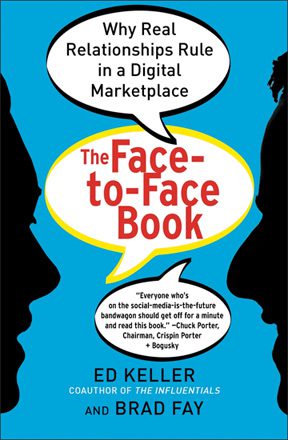A recent column in USA Today claims that Facebook can’t replace face-to-face conversation. The authors, Ed Keller and Brad Fay, of the KellerFay Group, claim to base their conclusions on six years of research, including more than 2 million conversations (?). They have found, for example:
•75% of conversations in the U.S. (and even more in other countries) still happen face to face; less than 10% take place through the Internet. The rise of social media, such as Facebook, has led to a reduction in e-mail “conversations,” but not a decline in face-to-face interaction.
•Face-to-face conversations tend to be more positive, and more likely to be perceived as credible, in comparison with online. What people talk about online differs dramatically from offline. The former tends to be driven by what is perceived as “cool,” while the latter tends to be about sharing real life experiences.
Why, then, is Facebook so popular, with over 900 million active users? Keller and Fay answer:
Facebook’s rise is merely Exhibit A of a much larger truth: Our modern society is not providing people with the human connections they crave, and online social networking is a rather poor substitute.
Statistics show that more people than ever live alone in the USA. According to the Census, about 31 million Americans live alone, representing 28% of the nation’s households.
I’m not sure this really explains the success of Facebook, though the aloneness of people is surely a factor.
Keller and Fay sum up their column thus:
Social media has helped us rediscover the power of “social.” But the richest social gold mine is literally right under our noses: in the word-of-mouth conversations that happen in our kitchens and living rooms, next to the office water cooler, and on the sidelines of youth sporting events. These are the places where we actually live our lives.
Facebook is a fine way to find long-lost friends and exchange tidbits of information and recommendations. But if we want to promote real change — as in our politics, public policies and cultural behavior — it’s best we do it face to face.
 I’d be interested to see greater detail about Keller’s and Fay’s research, which, I presume, will be possible on May 22, when their new book is released. I give them cleverness points for their title: The Face-to-Face Book: Why Real Relationships Rule in a Digital Marketplace.
I’d be interested to see greater detail about Keller’s and Fay’s research, which, I presume, will be possible on May 22, when their new book is released. I give them cleverness points for their title: The Face-to-Face Book: Why Real Relationships Rule in a Digital Marketplace.
How do I respond to the article by Keller and Fay. Partly, I applaud, because I think their point is worth making. Those who believe – and there are some – that digital relationships can be as rewarding as face-to-face relationships are walking down a lonely path. Yet, partly I yawn, because I believe Keller and Fay are proving the obvious. As people become more used to Facebook, Twitter, and the like, the initial euphoria over these kinds of relating seems to be dying out, with common sense returning. More and more people today see digital connection from a wider perspective in which fully human relationships retain their superlative value. Online media allow for an extension and enrichment of that which happens when people are physically present to each other.
Nevertheless, I will be interested to learn more about Keller’s and Fay’s research when their book is released. If they help us understand the role of digital social media more truly, and if they help us to value face-to-face interaction more fully, then I hope their book does well.











